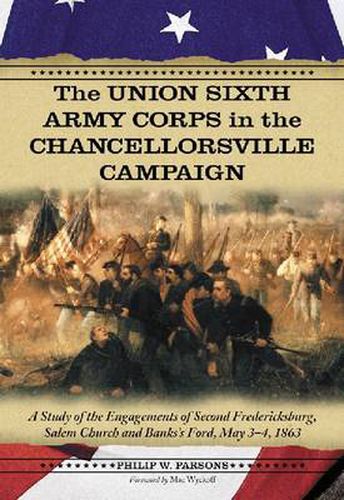Readings Newsletter
Become a Readings Member to make your shopping experience even easier.
Sign in or sign up for free!
You’re not far away from qualifying for FREE standard shipping within Australia
You’ve qualified for FREE standard shipping within Australia
The cart is loading…






This title is printed to order. This book may have been self-published. If so, we cannot guarantee the quality of the content. In the main most books will have gone through the editing process however some may not. We therefore suggest that you be aware of this before ordering this book. If in doubt check either the author or publisher’s details as we are unable to accept any returns unless they are faulty. Please contact us if you have any questions.
The winter of 1862-1863 found the Union’s Army of the Potomac in sad shape. Bloody battles, multiple defeats, lack of adequate provisions and high desertion rates had left even the hardiest Union soldiers dispirited. With Major General Joseph Hooker’s advent to the army command, he set about revamping the army’s conditions, establishing a generous furlough program, implementing a system of corps insignia and setting new sanitary standards. While his administrative efforts were extremely successful, his battlefield manner left something to be desired. Instructed by President Lincoln to make the destruction of General Lee’s Army of Northern Virginia the Union’s top priority, Hooker mounted the Chancellorsville Campaign. Lee’s aggressive battlefield manner coupled with Hooker’s failure to initiate an assault led to a sound defeat by Confederate forces and left Hooker–who ultimately had only himself and his lack of initiative to blame–looking for a scapegoat. Among those Hooker attempted to hold responsible was the courageous Sixth Army Corps, the unit responsible for the sole Union victory of the entire campaign. This military history focuses on the battlefield engagements of the Union’s Sixth Army Corps on May 3 and 4, 1863. Compiled from contemporary accounts as well as a variety of postwar histories, it examines the role which the Sixth Army Corps and their commander, Major General John Sedgwick, played in the Chancellorsville Campaign. Particular attention is given to evaluating the impact that the Corps’ actions had on Major General Hooker’s offensive and refuting the accusations which Hooker made following Federal retreat from the engagement. The battles of Second Fredericksburg, Salem Church and Banks’s Ford are consequently examined in detail. Appendices provide information detailing the organization of the Army of Northern Virginia, the Army of the Potomac and the Sixth Army Corps in the spring of 1863.
$9.00 standard shipping within Australia
FREE standard shipping within Australia for orders over $100.00
Express & International shipping calculated at checkout
Stock availability can be subject to change without notice. We recommend calling the shop or contacting our online team to check availability of low stock items. Please see our Shopping Online page for more details.
This title is printed to order. This book may have been self-published. If so, we cannot guarantee the quality of the content. In the main most books will have gone through the editing process however some may not. We therefore suggest that you be aware of this before ordering this book. If in doubt check either the author or publisher’s details as we are unable to accept any returns unless they are faulty. Please contact us if you have any questions.
The winter of 1862-1863 found the Union’s Army of the Potomac in sad shape. Bloody battles, multiple defeats, lack of adequate provisions and high desertion rates had left even the hardiest Union soldiers dispirited. With Major General Joseph Hooker’s advent to the army command, he set about revamping the army’s conditions, establishing a generous furlough program, implementing a system of corps insignia and setting new sanitary standards. While his administrative efforts were extremely successful, his battlefield manner left something to be desired. Instructed by President Lincoln to make the destruction of General Lee’s Army of Northern Virginia the Union’s top priority, Hooker mounted the Chancellorsville Campaign. Lee’s aggressive battlefield manner coupled with Hooker’s failure to initiate an assault led to a sound defeat by Confederate forces and left Hooker–who ultimately had only himself and his lack of initiative to blame–looking for a scapegoat. Among those Hooker attempted to hold responsible was the courageous Sixth Army Corps, the unit responsible for the sole Union victory of the entire campaign. This military history focuses on the battlefield engagements of the Union’s Sixth Army Corps on May 3 and 4, 1863. Compiled from contemporary accounts as well as a variety of postwar histories, it examines the role which the Sixth Army Corps and their commander, Major General John Sedgwick, played in the Chancellorsville Campaign. Particular attention is given to evaluating the impact that the Corps’ actions had on Major General Hooker’s offensive and refuting the accusations which Hooker made following Federal retreat from the engagement. The battles of Second Fredericksburg, Salem Church and Banks’s Ford are consequently examined in detail. Appendices provide information detailing the organization of the Army of Northern Virginia, the Army of the Potomac and the Sixth Army Corps in the spring of 1863.